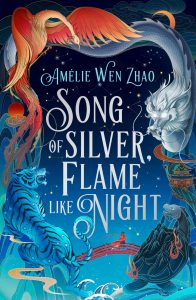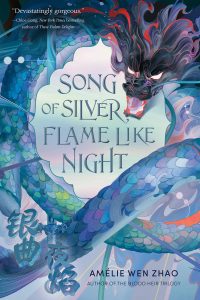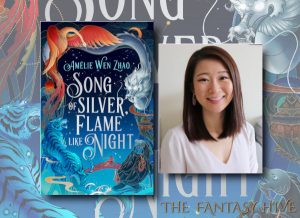Interview with Amelie Wen Zhao (SONG OF SILVER, FLAME LIKE NIGHT)
 Amélie Wen Zhao(赵雯)was born in Paris and grew up in Beijing, where she spent her days reenacting tales of legendary heroes, ancient kingdoms, and lost magic at her grandmother’s courtyard house. She attended college in the United States and now resides in New York City, working as a finance professional by day and fantasy author by night. In her spare time, she loves to travel with her family in China, where she’s determined to walk the rivers and lakes of old just like the practitioners in her novels do.
Amélie Wen Zhao(赵雯)was born in Paris and grew up in Beijing, where she spent her days reenacting tales of legendary heroes, ancient kingdoms, and lost magic at her grandmother’s courtyard house. She attended college in the United States and now resides in New York City, working as a finance professional by day and fantasy author by night. In her spare time, she loves to travel with her family in China, where she’s determined to walk the rivers and lakes of old just like the practitioners in her novels do.
Amélie is the New York Times bestselling author of the Song of Silver, Flame Like Night duology and the Blood Heir trilogy.
Welcome back to the Hive, Amélie! Congratulations on the release of the first book of your new duology – what can readers expect from Song of Silver, Flame Like Night?
Thank you, so great to be back! In Song of Silver, Flame Like Night, I think readers can expect something old and something new (and actually, now that I’m on this, there is also something borrowed, something blue). Those who have followed me from the Blood Heir trilogy will find so many of the tropes they love: slow-burn romance, morally gray characters who make morally gray choices, fast-paced action and beautiful, lush magic worlds. At the same time, Song of Silver, Flame Like Night is set in a completely new world and new culture: it is me taking my Chinese identity and heritage and just expanding it into a full-blown world of martial arts magic and scholarly temples tucked between lush pine forests and mountains that reach to the clouds. Song “borrows” heavily from Chinese history, philosophy, mythology, and culture. I think of this work as both a love letter to my people as well as a reflection and examination of the turmoils we have been through, and a celebration of the persistence of our spirit. And finally, something blue: I just have to gush about the gorgeous covers (both UK and US) that nailed the story in very different interpretations. I can’t wait for readers to fall into the world.
 Your world is inspired by Chinese mythology and folklore, and echoes the colonisation of China by Britain. What made you want to tell that particular story?
Your world is inspired by Chinese mythology and folklore, and echoes the colonisation of China by Britain. What made you want to tell that particular story?
Among my fondest memories of growing up in Beijing were the days I spent with my grandmother in her sìhéyuàn (traditional Chinese courtyard house), perched beneath the old jujube tree and listening to stories from her past. My grandmother (and actually, all of my grandparents) grew up during some of China’s most turbulent times: she fled her home as a child to escape Japanese invasion and natural disasters, and saw her country go through massive political changes. To add, my husband is from Hong Kong, which was one of the first territories ceded to the British as part of the Opium Wars and the Unfair Treaties where parts of China were cut up and handed to western powers like a pie. We’ve had many conversations on his home’s colonial history and what it means to us, and that cemented my desire to explore the impacts of colonialism and imperialism on a people and their heritage. I’ve realized from a very young age, since the days beneath my grandmother’s jujube tree, that the histories we read about in textbooks aren’t so distant from us after all: they live and breathe in us, passed on to us by those who lived through them, and they are a part of our legacy. I wanted to tell these stories – and these histories – to honor the memory of my grandparents, my family, my people, and all those who came before them.
To come back to the mythology and folklore, what particular stories inspired Song of Silver, Flame Like Night? Which is your personal favourite?
Song of Silver, Flame Like Night features a number of our myths and folklore: so many creatures of our Classic of Mountains and Seas (the ancient book chronicling many mythological beasts and beings across China) appear in Song. As well, the Four Auspicious Beasts of Chinese mythology, which, in my version, are no longer auspicious but rather, self-serving, power-hungry, and chaotic. Though… I think my favorite myth woven into Song is one of romance: Lan often mentions a “red thread of fate” connecting her and Zen. This comes from a Chinese myth that there is a red thread connecting lovers destined for each other.
We need to talk about the incredible magic systems in Song of Silver, Flame Like Night. The Hin use qi and Seals, whereas the Elantians use metallurgy. Each magic system is a strong reflection of the people who practise it; what were your aims here?
The two branches of magic are actually distantly related: while Hin practitioners are able to draw qì (magical energy or life force) from anything and everything around them, the Elantians are only able to wield the energy of metals, and have developed a much more scientific and systematic method of using the metals. The two magic systems are meant to denote the philosophies of each group. The Hin approach is meant to be one of balance, of harmony with nature, and of using their magic to protect and nurture – that is, until greedy Hin practitioners and imperial rulers came along and began hoarding power for self-serving needs. In contrast, Elantian metalwork is a much more incisive and calculated system: the Elantian have studied it like a science and refined it with the goal of militarizing and weaponizing it. Metal tends to represent industry and war, so I thought that was both a clever and rather on-the-nose reference.
Tell us more about your protagonists Lan and Zen? They don’t meet under particularly auspicious circumstances!
Lan and Zen have my whole heart, and I had so much fun with this grumpy-sunshine, street rat-scholar duo. Writing them was like peeling back layers of an onion: both present as confident and self-assured at first, but as we get to know them, we start to see the emotional burdens and traumas of their pasts that they tend to hide from the world. And writing them together was like taking off layers and layers of armor … and having them fall in love with the person inside. Without spoiling anything, Lan and Zen also illustrate the theme of how life isn’t just black and white, and how sometimes there might not be a “right” choice in certain circumstances.
They each have a great number of secrets and carry some serious trauma. How important is representing these issues for teens and young adults to you?
Teens and young adults have so much they’re working through, and there is so much nuance to their thoughts and identity: as a teen, I recall I was trying to understand the world as it is while finding my own identity and how I fit in it. I think one of the factors that differentiates young adult literature from adult literature is that there tends to be more of an element of hope in the YA age category. I always go into writing my books and my characters with realistic situations and grief, yes – but I always write these characters with heart and hope. The world may be dark at times, but my characters never stop searching for those fragments of light.
 The US and UK covers are gorgeous – I have the UK edition, and it’s what made me reach out and request an arc! Were you pleased with how they portrayed the four demon gods?
The US and UK covers are gorgeous – I have the UK edition, and it’s what made me reach out and request an arc! Were you pleased with how they portrayed the four demon gods?
Both covers are completely stunning, and I am indebted to the artists Diamonster (UK) and Sija Hong (US). They portray the story and themes in very different ways, and I honestly couldn’t be more thrilled with how the artists interpreted the book. Both have a deep understanding of Chinese culture, and I think it truly shows in how they rendered the covers!
Your previous trilogy, Blood Heir, is quite different! How did you find the writing process, moving away from that world and the characters you knew so well?
I think my two series are ostensibly very different because of the aesthetics and cultures, but if you take a look at their hearts, they carry the ingredients that make my books, well, my books: immersive worlds and magic systems, fast-paced action, conflicted characters, and themes on politics, destinies, and choices. That said, moving to a different world or even a different character always requires an adjustment period. I think of it as breaking in new shoes: I need to walk a few miles in them before I’m completely comfortable with them. At first, writing a new world and new characters can feel slightly forced compared to writing the cast and world of Blood Heir (who’ve been with me for the past seven years!). But as I write, certain elements of the world start setting in, and the characters’ voices and personalities come naturally to me like they’re friends I’ve gotten to know (except they live in my head). The wonderful thing is that when I go back to the books I’ve written, the characters and worlds are always there like old friends, ready to greet me.
Can you tell us anything about book two of Song of the Last Kingdom? What can we expect?
I’m very excited for readers to continue Lan and Zen’s stories, and also a little nervous because of what I’m putting them through. Expect starcrossed angst, diverging and conflicting choices, shock reveals, and to fall deeper into lush realms of mythology and magic in this world that weren’t previously explored in book one. I can’t wait.
And finally, do you have anything in the pipeline for after the Last Kingdom? What’s next for Amélie Wen Zhao?
I’ve been so busy with revisions for book two of this series, I haven’t let myself truly dream about my next project because I’ll get too excited and want to immediately begin writing it! Just thinking about it gives me the butterflies: it’s also a world of Chinese mythology and folklore, and epic and romantic with all the classic xiānxiá C-drama vibes. Think peach blossom petals, palaces of jade and stone, flying swordsmen, goddesses hiding secrets, and star-crossed loves.
Song of Silver, Flame Like Night is out now in the US (order here) and is out 2nd Feb in the UK (order here)

